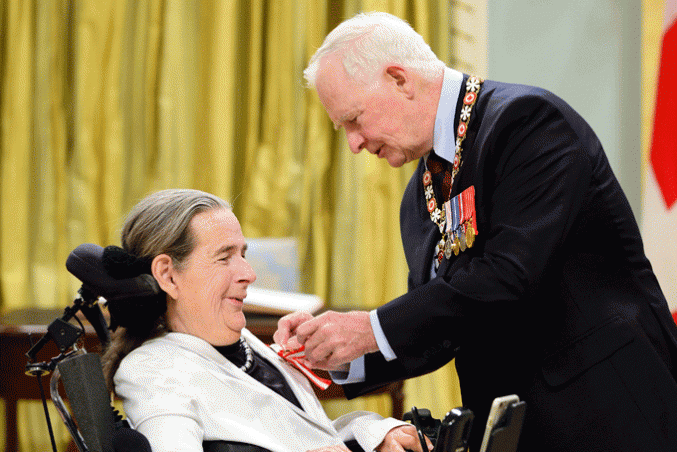By Emily Craig-Evans
As Ryerson School of Disabilities Studies professor emerita Catherine Frazee was anxiously preparing to go to Rideau Hall to be named an officer of the Order of Canada, she was expecting the formality of the induction ceremony to make her uncomfortable.
Despite her racing heart and mix of emotions, what she found was a comfortably warm and welcoming environment among the 95 other Canadians made companions, officers and members of the Order of Canada on Nov. 18.
Appointed to be named last December, Frazee said she felt humbled to receive the insignia.
“Of course you’re excited, and proud and thrilled by the surprise and the honour of it, but very quickly there’s another whole layer of responses that kick in that have to do with a sense of humility,” Frazee said.
Her humility comes from an awareness that she couldn’t have gotten where she is today without the work of others. Frazee felt she must accept the designation on behalf of the many people with disabilities who have not had the same opportunities as her, yet have made “profound contributions to the lives of others, and to the life of Canada.”
“I went into the process […] feeling that I would accept this on behalf of the people that I know who have served in many, many ways and will continue to do so,” she said.
The formal ceremony, which saw the induction of famous Canadians Chris Hadfield and Blue Rhodeo’s Jim Cuddy, was followed by dinner and socializing.
The drawing room of Rideau Hall contains renowned Canadian musician Glenn Gould’s piano, which was donated on the condition that it be played. Now living in Nova Scotia, Frazee described what ensued around the piano at Rideau Hall as a “maritime kitchen party.”
“Quite spontaneously we had a jam session with musicians representing a whole range of genres,” she said.
The Order of Canada was established in 1967 to recognize Canadians from all sectors of society who have served the nation through outstanding achievement and service to the community. There are three ranks in order of increasing merit, member, officer and companion, and more than 6,000 Canadians have been invested into the order to date.
Frazee describes herself in three roles: writer, educator and activist. During her ten years teaching at Ryerson, she also chaired the values and ethics task force of the Canadian Association for Community Living and served on the board of directors of the Abilities Arts Festival — now known as Tangled Arts.
Working with students, alumni, activists and scholars, she co-curated “Out From Under” in 2007, a diverse exhibit which presents everyday objects with statements about each’s laden meaning to the disability community and its history. The collection can be viewed online or at the Canadian Museum for Human Rights.
Currently, Frazee is concluding months of community research conducted with a panel designed to collect thoughtful perspectives on the implementation of assisted death. She is one of three people on the panel.
Following the Supreme Court of Canada ruling in February that Canada’s ban on assisted death is unconstitutional, federal and provincial governments are seeking information that would best allow them to proceed legislating the complex process. The panel’s talks with medical and pharmaceutical associations as well as advocacy groups are not meant to bring forth recommendations, but a thorough presentation of the broad perspectives that exist.
Up for debate is how to best determine a person’s competency when seeking the authority to end his or her own life, particularly in cases where a person’s suffering is mental.
What is unanimous, Frazee said, is the belief that the implementation of assisted death should be individually considered in a thorough case by case process and that Canadians need greater access to palliative care.
The panel is scheduled to report their findings to the Minister of Justice and the Minister of Health on Dec. 15.












Leave a Reply